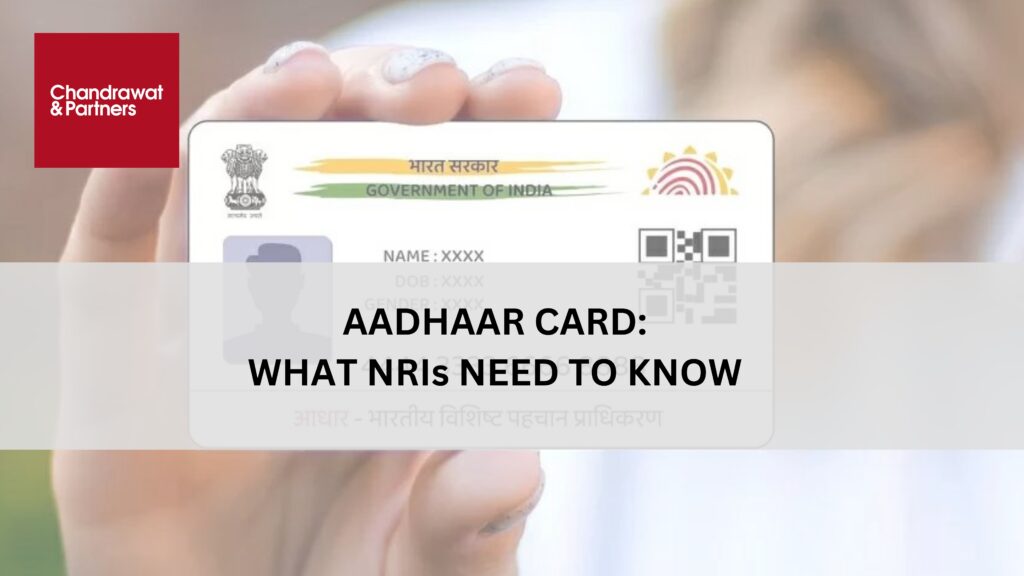
Share :
AADHAAR CARD: WHAT NRIs NEED TO KNOW
Living abroad as a Non-Resident Indian (“NRI”) often involves navigating numerous financial and administrative processes. A key tool that has significantly simplified these procedures for NRIs is the Aadhaar card. In an era of digitization and seamless connectivity, the Aadhaar card has become a cornerstone of India’s administrative and financial landscape. Although initially designed for residents of India, the Aadhaar card has also become increasingly relevant for NRIs, aiding in the streamlining of various processes, from financial transactions to administrative tasks.
UNDERSTANDING AADHAAR FOR NON-RESIDENT INDIANS
The Aadhaar card, introduced by the Unique Identification Authority of India (“UIDAI”), serves as a unique identification document containing biometric and demographic information. Initially aimed at residents of India, the Aadhaar card has gradually extended its utility to NRIs, offering them a simplified means of authentication and verification. Although not mandatory for NRIs, the Aadhaar card can streamline various processes in India.
In July 2019, the Government of India facilitated the issuance of Aadhaar cards to NRIs on arrival, eliminating the previous requirement of residing in India for a minimum 182 days. NRIs can now apply for an Aadhaar card in the same manner as resident Indians. To qualify, applicants must be at least three years old, hold a valid Indian passport, and provide all necessary documents required for Aadhaar card issuance for NRIs.
IMPORTANCE OF AADHAAR CARD FOR NIRs
- KYC Compliance:An Aadhaar card is essential for Know Your Customer (KYC) procedures, which is mandatory for all online transactions in India.
- Proof of Identity and Address: It is accepted as a proof of identity and address for various activities, such as purchasing property in India and opening a bank account.
- Income Tax Compliance:According to Section 139AA of the Income Tax Act of 1961, an Aadhaar card is mandatory for e-filing income tax returns in India.
- Government Benefits:An Aadhaar card is necessary for availing of the benefits of all government subsidies and social welfare schemes in India.
- Employment Requirements: An Aadhaar card is required for employment in India, particularly in the government sector.
LAWS AND REGULATIONS
The legal framework governing Aadhaar and its applicability to NRIs is primarily outlined in the Aadhaar Act, 2016. Although the Aadhaar Act, 2016 mainly addresses residents of India, it does not explicitly exclude NRIs. However, certain provisions, such as the requirement for physical presence during Aadhaar enrollment, may pose challenges for NRIs.
HOW NRIs CAN APPLY FOR AN AADHAAR CARD?
Under the Aadhaar Act of 2016, the UIDAI is responsible for the enrollment and management of Aadhaar cards. The process for NRIs to apply for an Aadhaar card involves several steps:
- Book an Online Appointment:
- Visit the official UIDAI portal and select the preferred language.
- Navigate to the “My Aadhaar” section and book an appointment.
- Submit an Indian mobile number as it is mandatory for NRIs.
- Select the resident type as “NON-RESIDENT INDIAN,” enter the email ID, and click on “Send OTP.” NRIs can book their appointment online before arriving in India or visit an Aadhaar enrollment center to book an appointment offline.
- Submit Required Documents:
- After booking an appointment, visit the Aadhaar enrollment center and submit the necessary documents.
- Upon completion of the process, applicants receive an acknowledgment slip containing a 14-digit Aadhaar enrollment number. Within a few days, a unique Aadhaar ID is generated and sent to the applicant’s registered email address. Alternatively, the e-Aadhaar can be downloaded from the UIDAI website.
KEY POINTS ON AADHAAR CARD REQUIREMENTS FOR NRIs
- Applying for an Aadhaar card is not a legal requirement for NRIs. However, it is mandatory for income tax e-filing in India.
- The Aadhaar card does not serve as proof of Indian citizenship and does not grant NRIs the right to vote or participate in certain activities unless they meet specific criteria.
- Linking the Permanent Account Number (PAN) and bank accounts with Aadhaar is not necessary for NRIs unless they wish to avail themselves of certain benefits.
- Additionally, NRIs can use the electronic version of Aadhaar, known as e-Aadhaar or m-Aadhaar, as a valid document in place of the physical Aadhaar card.
HOW WE CAN HELP?
- Whether resolving discrepancies, addressing concerns with government agencies, or advocating for NRI rights, our dedicated team is committed to protecting clients’ interests.
- Our team assists with the online appointment booking process, ensuring a smooth and hassle-free experience.
- The application process is streamlined through the preparation and submission of all necessary documents with accuracy, expediting approval.
- We keep clients updated on the latest changes in regulations and policies related to Aadhaar and NRI financial matters.
- We facilitate the secure storage and management of sensitive personal documents throughout the application process.
For more information or queries, please email us at
enquiries@chandrawatpartners.com



